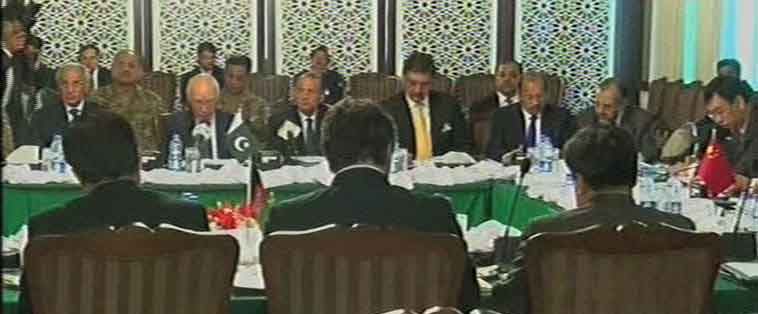Pakistan hosts four-nation talks on Afghan peace process

Pakistan gives great importance to neighboring countries, Sartaj Aziz said.
ISLAMABAD (Web Desk / AFP) - The first ever round of a quadrilateral meeting involving Afghanistan, Pakistan, China and the US aimed at reviving dialogue between Kabul and the Afghan Taliban is underway in Islamabad.
Adviser to PM on Foreign Affairs Sartaj Aziz, while addressing the opening session, said Pakistan wants to further the reconciliatory process in Afghanistan.
Pakistan gives great importance to neighboring countries and it is our duty to ensure peace in the region, he added.
He pointed out that the 5th Ministerial Conference of the Heart of Asia in Islamabad last month provided impetus to our quest for lasting peace in Afghanistan.
The meeting on the sidelines of the Conference between Prime Minister Nawaz Sharif and President Ashraf Ghani as well as quadrilateral interaction among Pakistan, Afghanistan, US and China reflected important consensus on the way forward on Afghan peace and reconciliation process.
The advisor said on 27th of last month, Chief of Army Staff General Raheel Sharif visited Afghanistan and had useful interaction with the Afghan side for strengthening the security and counter-terrorism cooperation through intelligence sharing and facilitating the Afghan peace and reconciliation process.
He said the meeting of the Quadrilateral Groups has a great significance.
Aziz expressed confidence that the meeting will be able to evolve an efficient procedural framework to provide the basis for smooth functioning of the group.

Some analysts hope the added presence of China and the United States may help overcome mistrust between Pakistan and Afghanistan, though Taliban representatives themselves are not due to attend and it remains unclear when they will return to the negotiating table.
The so-called "roadmap" talks are meant to lay the groundwork for direct dialogue between Kabul and the Taliban, whose insurgency shows no signs of abating more than 14 years after they were ousted from power by a US-led coalition.
Javed Faisal, spokesman for Afghanistan s Chief Executive Abdullah Abdullah, confirmed the talks and added: "The Pakistani government will present the list of Taliban who are willing to talk and those who are not interested in talks."
TALIBAN INFIGHTING
A first round of dialogue with the Taliban was held in July but collapsed after the group belatedly confirmed their Mullah Omar was dead.
News of his death led to infighting between senior Taliban leaders and the group‘s new chief Mullah Akhtar Mansour, which in turn led to the creation of a new faction headed by Mohamed Rasool in November.
Mansour himself was shot and wounded near the Pakistani city of Quetta in December, apparently by one of his own men.
But despite the internal rifts and the onset of winter, the group have continued to carry out brazen attacks.
In September the Taliban briefly seized the northern provincial capital of Kunduz -- the first time they had gained control of a city since the fall of their regime in 2001.
And in recent weeks they have seized large swathes of the key opium-rich district of Sangin in the southern province of Helmand, their traditional stronghold.
Observers say the intensifying fighting highlights a push by the militants to seize more territory to try to secure greater concessions during any direct talks.
A senior Taliban source from Mansour‘s faction told AFP that Pakistan had been in touch with Taliban leaders, but the group was waiting to see whether their rivals from Rasool‘s faction were also likely to attend.
"As far as I know the Taliban leadership is willing to attend any such meeting in future but we will also see which other Afghan group or a Taliban splinter group will be invited for these proposed peace talks," he said.
Rahimullah Yousufzai, an expert on militancy, termed the talks an "important development", adding the presence of the US and China provided extra weight.
But he cautioned: "The Taliban have not yet showed their willingness to talk, they said their first priority is to end their differences. In my opinion the splinter Rasool group will come but the presence of Mansour group is very important, so let us wait to see how they react."
WATCH VIDEO BELOW:


